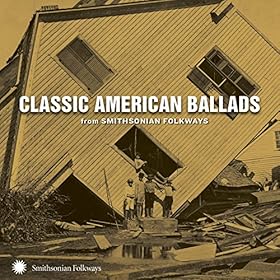| various artists, Classic American Ballads from Smithsonian Folkways (Smithsonian Folkways, 2015) Friendly advice for which you can thank me later: Dig into your pocket and shell out the necessary currency for Classic American Ballads, which numbers no fewer than 25 cuts and sells for less than you'd pay for whatever act is currently topping the charts -- I'm looking at you, Taylor Swift -- and soon destined to pass into the netherworld of pop music that has exhausted its brief sell-by date. These sturdy story-songs, on the other hand, survive as a people's record of dark and (more rarely here) comic experiences, most of which would be unnoted otherwise. At their core, as this collection movingly documents, traditional ballads speak to our collective memory. All of the cuts came into the world on Folkways albums. They are the latest in a series in which the label's present owner, Smithsonian, plumbs into the archives and shines light on specific strains of folk music (mostly but not exclusively American): everything from mountain sounds, bluegrass, downhome blues, early jazz, ocean-going songs and shanteys, 1960s revival. Smithsonian Folkways has managed to fill two dozen anthologies (American Ballads is the 24th) with engrossing grassroots music. Of these the closest to a companion volume is Classic African-American Ballads (2006).
The set debuts with the venerable "Banks of the Ohio," exemplifying the curious truth that in ballads the vilest acts are usually set to lovely waltz melodies. The performers are two giants of American folk, guitar master Doc Watson and bluegrass founder Bill Monroe, and no more need be said, except that as often as I've heard this ballad (possibly first on an early Joan Baez record with the Greenbriar Boys) I never tire of it. In my mind -- don't ask me why -- the psychopath-killer's day job is as a small-town bookkeeper. The final cut is a splendid unaccompanied reading (by Doc Watson's mother Annie) of another well-known ballad, "The F.F.V." (aka "Engine 143" and "Wreck of the C&O") dating to a fatal accident in Virginia in 1890. The artists are in part revivalists (e.g., Cisco Houston, Pete Seeger), in part source singers (Pink Anderson, Buck Ramsey), and in another part figures with allegiances in both camps (Lead Belly, Woody Guthrie). Seeger is used to particularly strong effect; his readings of "Blue Mountain Lake" and "Young Charlotte" make clear just how good he could be in the service of purely traditional songs. On the other hand, Rolf Kahn & Eric Von Schmidt's "Frankie & Johnny," in my judgment the least successful track, is overcooked and overlong (6:39). Oddly, the title notwithstanding, this is "Frankie & Albert," the St. Louis folk ballad on which the 1904 Tin Pan Alley song, which I've disliked since I was a kid, was loosely based. The version you want to hear is Mississippi John Hurt's "Frankie," which you can find on Volume 1 of Harry Smith's Anthology of American Folk Music and elsewhere. Most everything, though, is a delight. Not least is Doug Wallin's riveting "Naomi Wise," carried by his voice alone. Bascom Lamar Lunsford weighs in with a welcome, if suitably ominous, reading of "Springfield Mountain," among the first ballads created on American soil, well known in the latter 18th and 19th centuries but nearly forgotten now. Let it be a warning to all, namely us herpetophobes who shake at the sight even of harmless snakes. Hermes Nye warms my heart with "Sam Bass," which has always ranked high on my list of favorite American folk songs. Bruce Buckley delivers a suitably lugubrious "Pearl Bryan," about a shockingly cruel, much-publicized-at-the-time murder in 1896 Cincinnati. Among the missing is Cisco Houston's good-humored rendering of "Zebra Dun," which is done instead by the late Joan O'Bryant, so we'll have to settle for his way with "Tying a Knot in the Devil's Tail," written in 1917 by cowboy versifier Gail Gardner to relate a drunken scrap with Ol' Scratch in the mountains outside Prescott, Arizona. The liner booklet provides a rich source of often obscure information about songs, composers and performers. A typo, though, accomplishes some gender switching when we learn that "Cowboy's Lament/Streets of Laredo" (sung in fine fashion by another, more recent cowpuncher poet, the late Buck Ramsey) was the creation (in 1876) of "cowboy poet Frances [sic] Henry Maynard." The correct spelling, of course, is Francis, and he preferred to be known as Frank. Like many vernacular writers, Maynard composed on the template of a pre-existing text, which commenced its career in the 18th-century British Isles as "The Unfortunate Rake" (whose title character is dying not of a gunshot, as the later cowboy, but of venereal disease) before evolving into "Tom Sherman's Barroom," "St. James Hospital" and more. History books exist to recount the past as accurately as possible, whereas traditional songs start with facts and then wander off merrily elsewhere. Little about "Jesse James" is true beyond the basic reality that he was a notorious outlaw eventually ambushed by gang member Robert Ford, but it seems a tad gratuitous for revival singers Cunningham, Millius, Houston to insert their self-composed fiction into the song, claiming James's "mother was murdered by a railroader's gun." In prosaic reality nothing of the sort ever happened. To the contrary, his mother lived on long enough to sell pieces of her son's tombstone to souvenir-seeking tourists. Never mind. If you don't love this thrilling collection, I won't be so presumptuous as to fear you may be dead. Still, you might check your pulse. 
|
 Rambles.NET music review by Jerome Clark 4 April 2015 Agree? Disagree? Send us your opinions!  



 |

